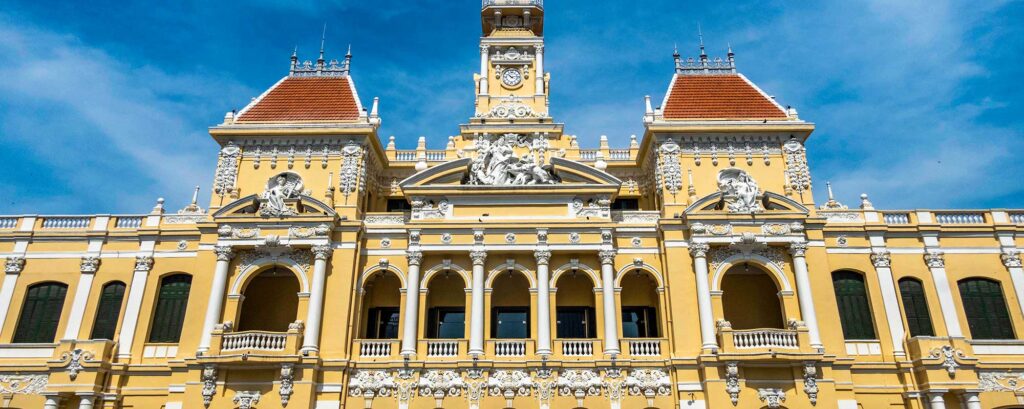Ho Chi Minh City is a treasure of historic and colonial buildings, each carrying a unique story of the city’s rich past. From the iconic Saigon Central Post Office and Saigon Notre Dame Cathedral, reflecting French architectural influence, to the grand Reunification Palace symbolizing the country’s reunification, these buildings showcase the city’s fascinating history. Other notable landmarks include the elegant Saigon Opera House, the historic Caravelle Hotel, and the vibrant Binh Tay Market.
Also read our list of French colonial architecture in Vietnam.
1. Saigon Central Post Office
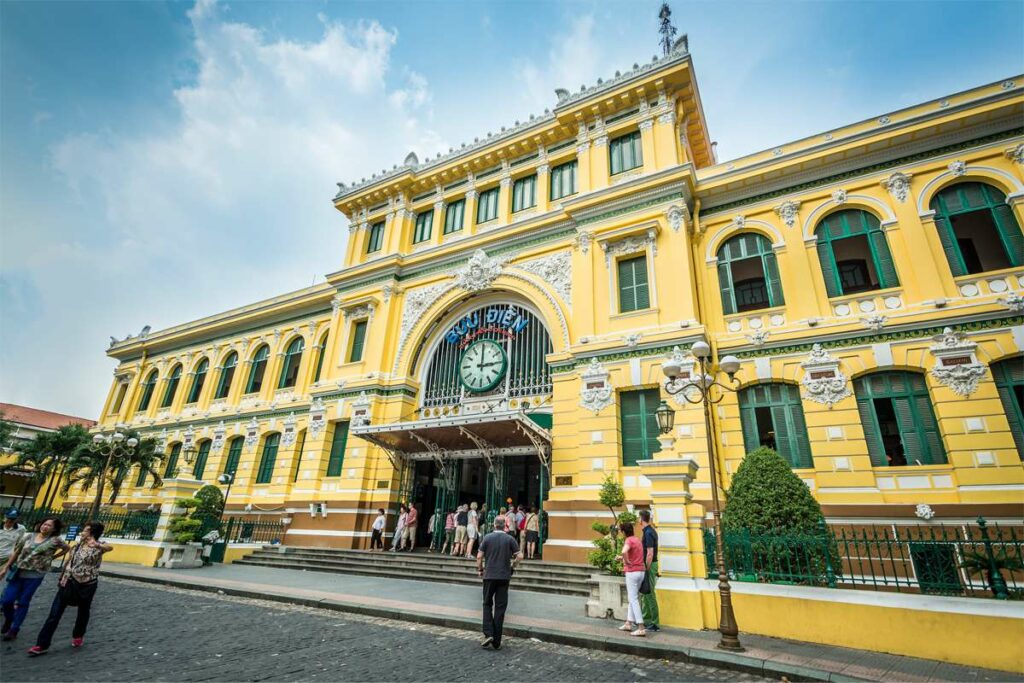
Designed by Gustave Eiffel, the Saigon Central Post Office is a remarkable example of French colonial architecture. Its grand façade features arched windows, a clock tower, and intricate ironwork. Inside, you can admire the ornate interior, including a beautiful mosaic map of Vietnam.
2. Saigon Notre Dame Cathedral
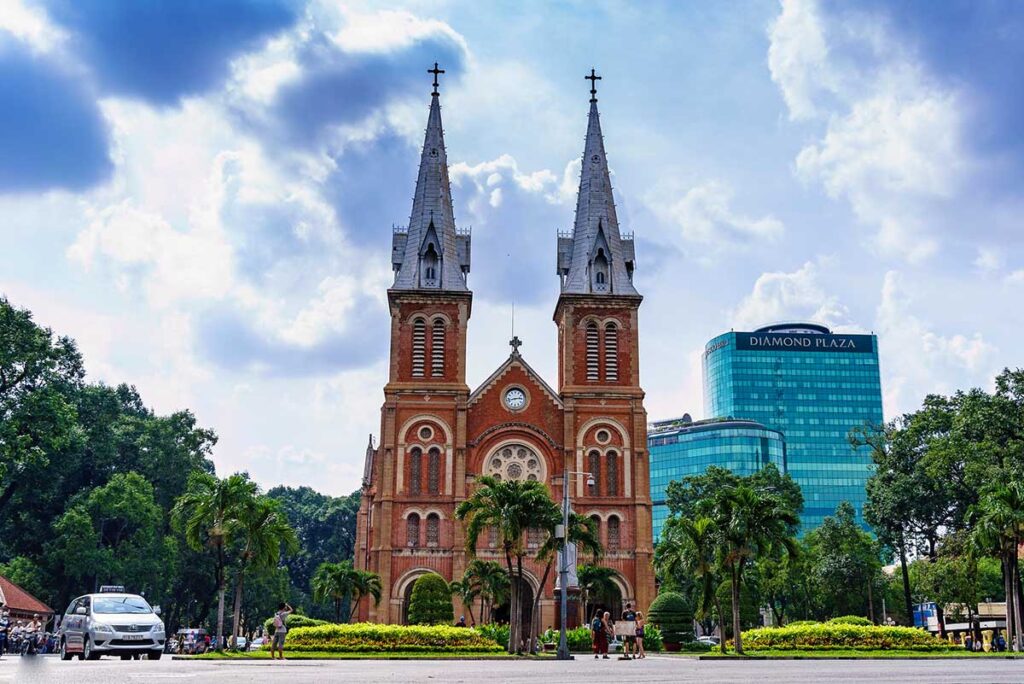
Built during the French colonial era, Saigon Notre Dame Cathedral is an iconic symbol of Ho Chi Minh City. The cathedral’s twin bell towers stand tall at over 58 meters, offering a striking visual presence. Its impressive façade, made with imported red bricks from France, and stunning stained glass windows make it a must-visit landmark.
3. Reunification Palace
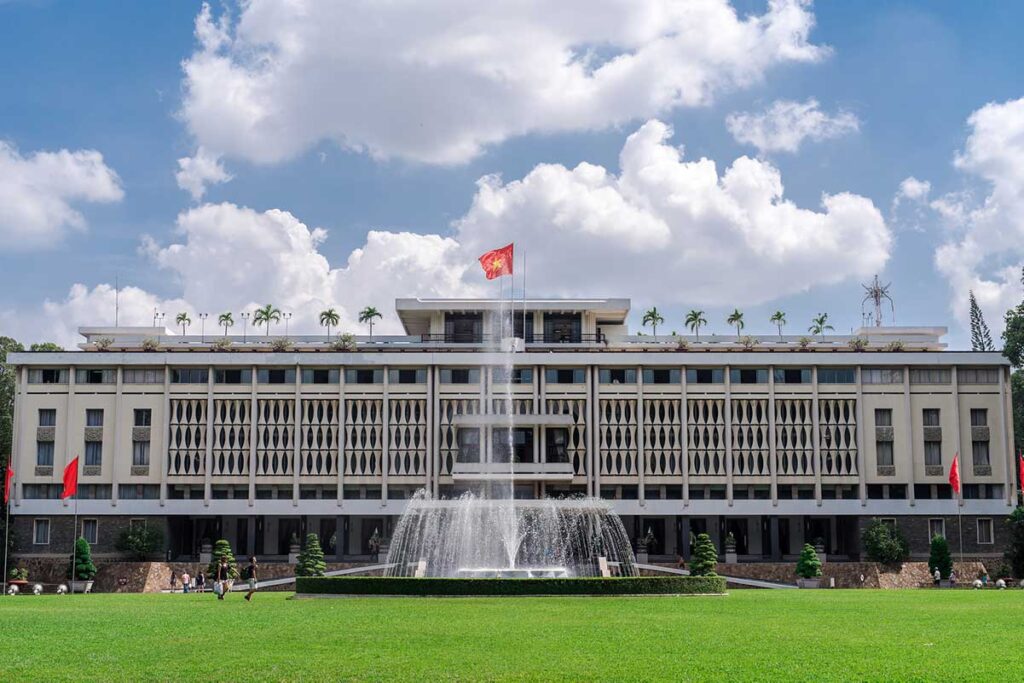
Formerly known as the Independence Palace, the Reunification Palace played a significant role in Vietnam’s history. The building served as the presidential palace during the Vietnam War, and it was here that the end of the war was symbolically marked with the North Vietnamese tank crashing through its gates on April 30, 1975. Today, visitors can explore its preserved rooms, including the war command center, and gain insights into Vietnam’s past.
4. Saigon Opera House
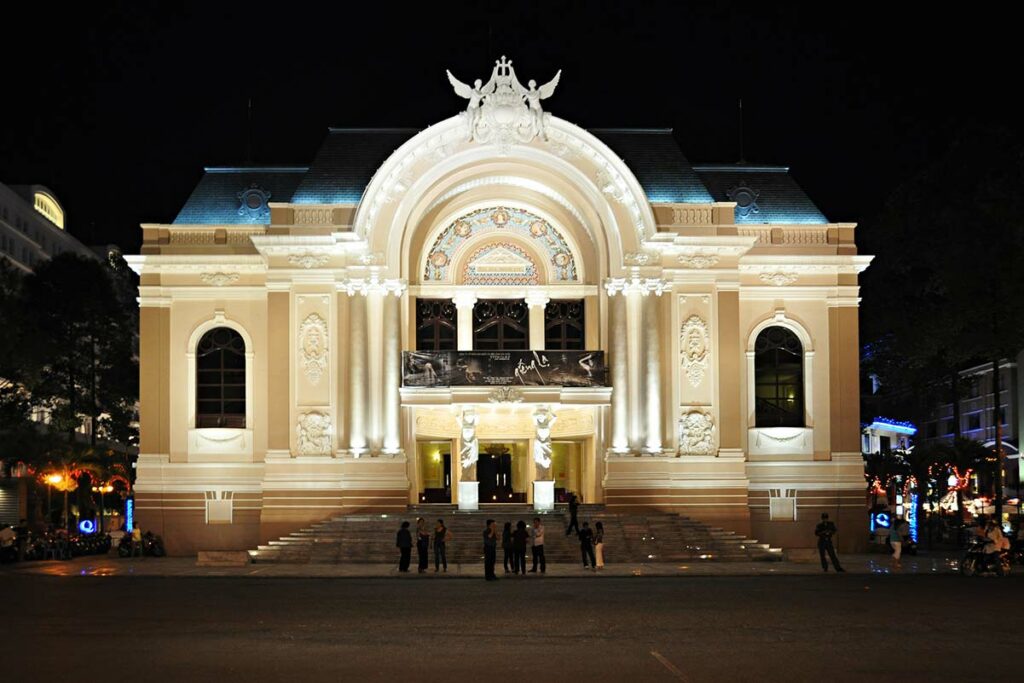
The Saigon Opera House, also known as the Municipal Theatre, is a stunning example of French colonial architecture. Its elegant façade, adorned with ornate decorations and statues, is a sight to behold. The opera house hosts a variety of cultural performances and is a beloved venue for music, ballet, and theatrical shows.
5. Ho Chi Minh City Hall
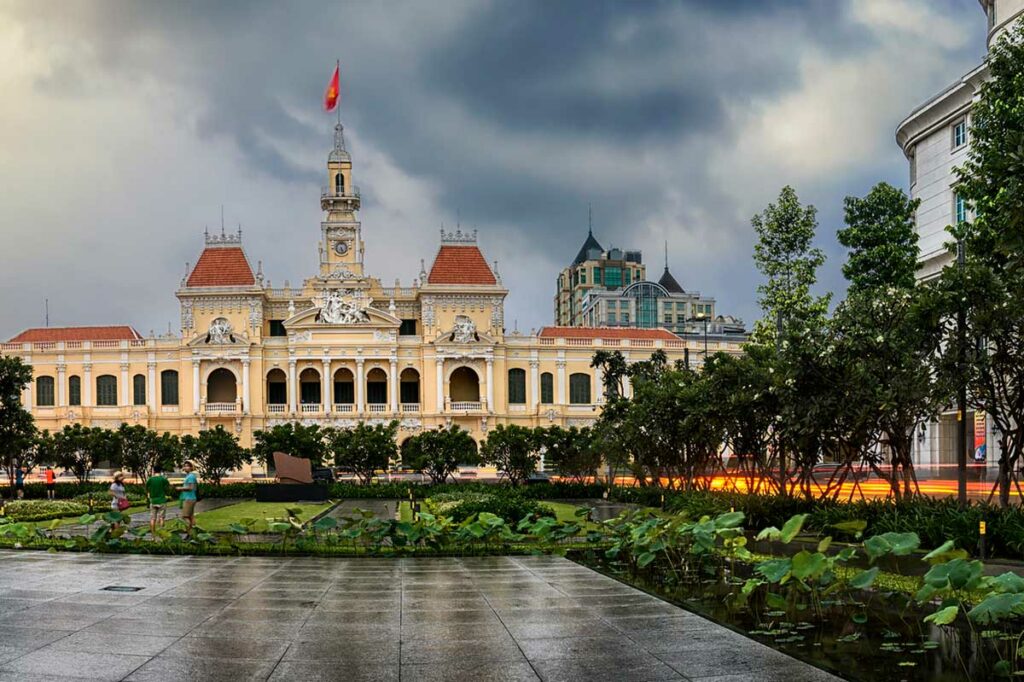
Situated at the end of Nguyen Hue Walking Street, this impressive French colonial-era building with its distinctive facade represents the city’s administrative center. Its grand structure and iconic clock tower make it a prominent landmark. While the building is not open to the public, you can appreciate its exterior beauty and take photos in front of this historic government building.
6. Continental Saigon Hotel
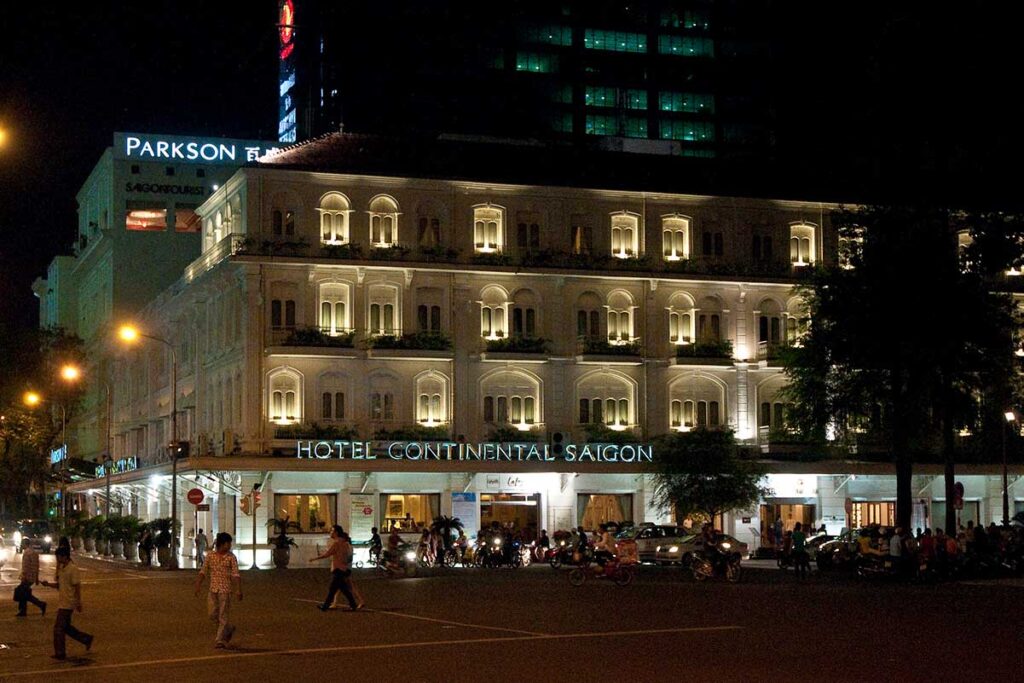
As one of the oldest hotels in Ho Chi Minh City, the Continental Saigon Hotel has a rich history and colonial charm. It has been a favorite choice for many famous writers, journalists, and diplomats throughout the years. The hotel’s façade and interior exude classic European elegance, providing a glimpse into the city’s colonial pa
7. Rex Hotel
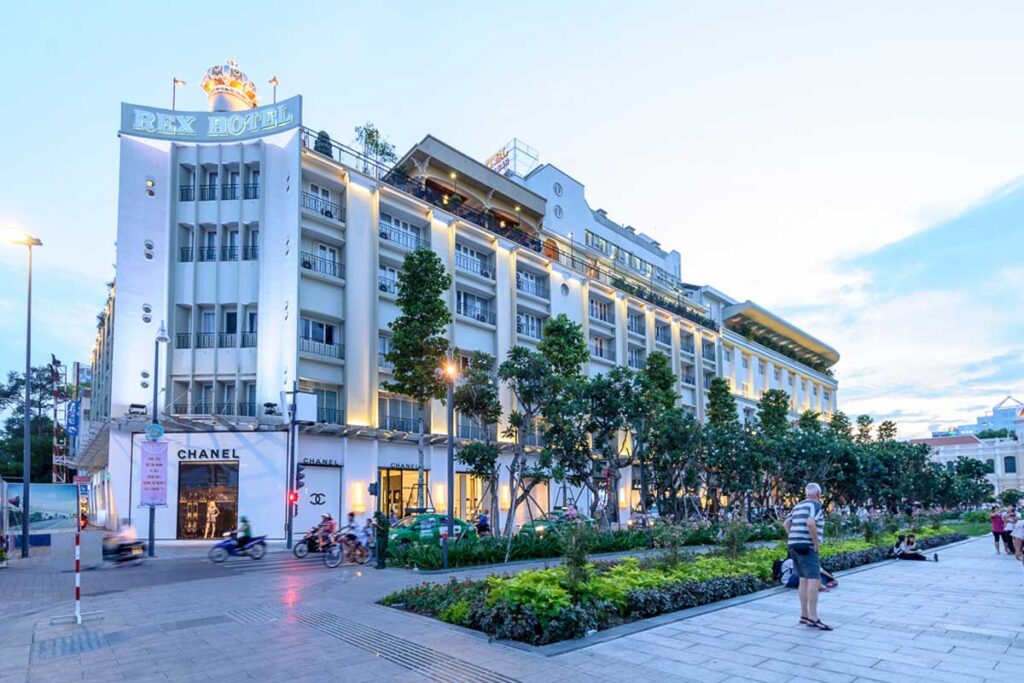
The Rex Hotel is a landmark building in Ho Chi Minh City, known for its historical significance during the Vietnam War. It was a popular gathering place for journalists, diplomats, and military personnel. Today, the hotel offers a blend of French colonial charm and modern amenities, making it a popular accommodation choice for tourists.
8. Ben Thanh Market
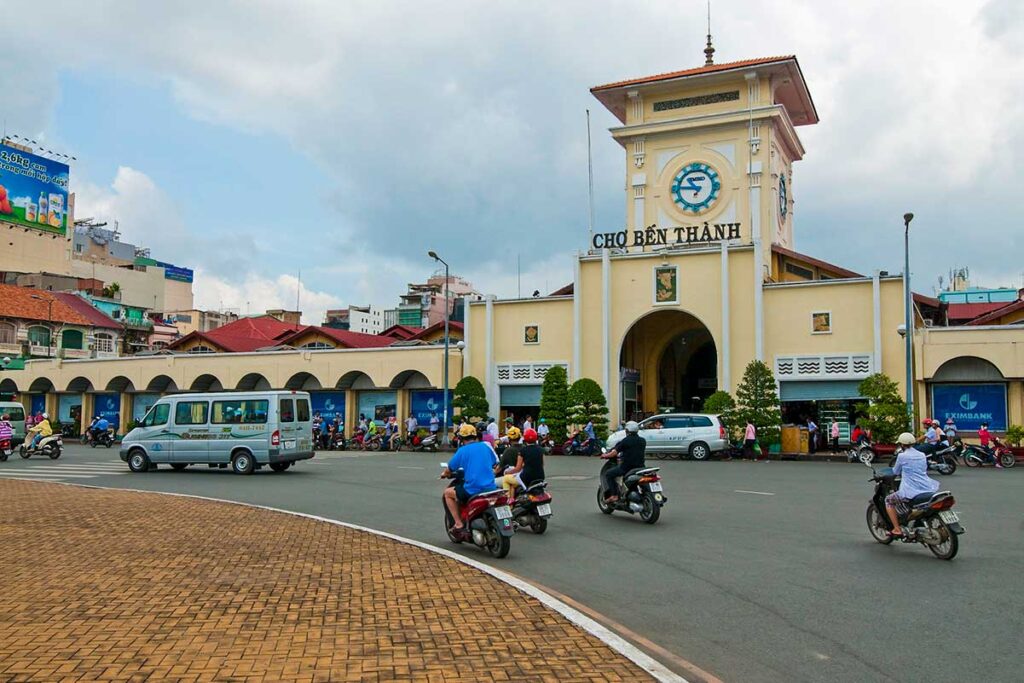
One of the oldest and most iconic markets in Ho Chi Minh City, Ben Thanh Market is a bustling hub of activity. The market’s distinctive clock tower entrance welcomes you to a maze of narrow aisles filled with a vibrant array of goods, including clothing, handicrafts, spices, and street food. It’s a must-visit destination to experience the sights, sounds, and flavors of Vietnamese market culture.
9. Ho Chi Minh City Museum of Fine Arts
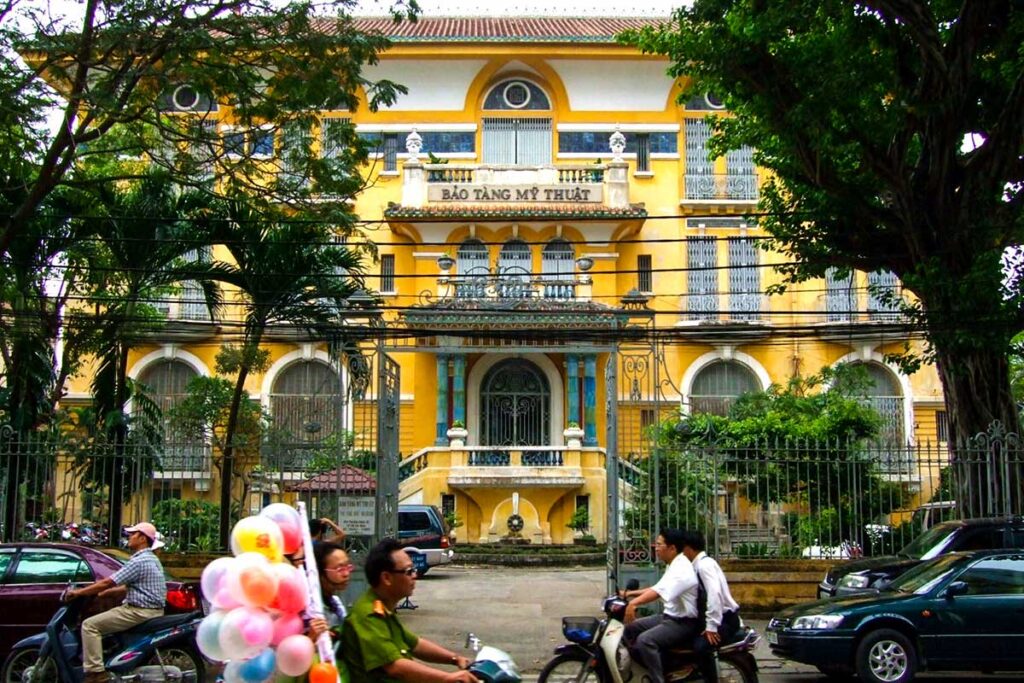
The Ho Chi Minh City Museum of Fine Arts is housed in a historic colonial building that adds to its charm and character. The museum showcases a diverse collection of artworks, including traditional Vietnamese pieces and contemporary exhibits, providing a glimpse into the rich artistic heritage of the city. Visiting the museum allows you to appreciate the intersection of history, culture, and artistic expression in Ho Chi Minh City’s colonial past.
10. Binh Tay Market
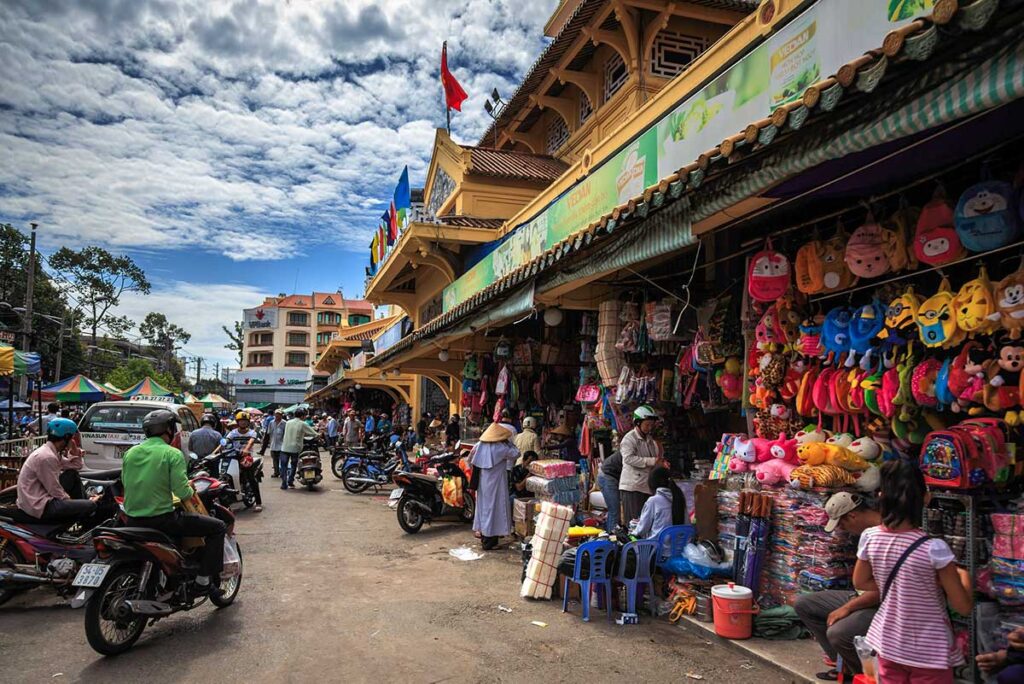
Binh Tay Market, located in Ho Chi Minh City’s vibrant Chinatown, is not only a bustling marketplace but also a historic landmark. Built in the early 20th century, this Chinese-style market serves as a testament to the rich cultural heritage of the Chinese community in the city.
The market is known for its bustling atmosphere, diverse range of products, and affordable prices. From fresh produce and local delicacies to clothing, handicrafts, and household items, Binh Tay Market is a must-visit destination.
11. Thien Hau Pagoda
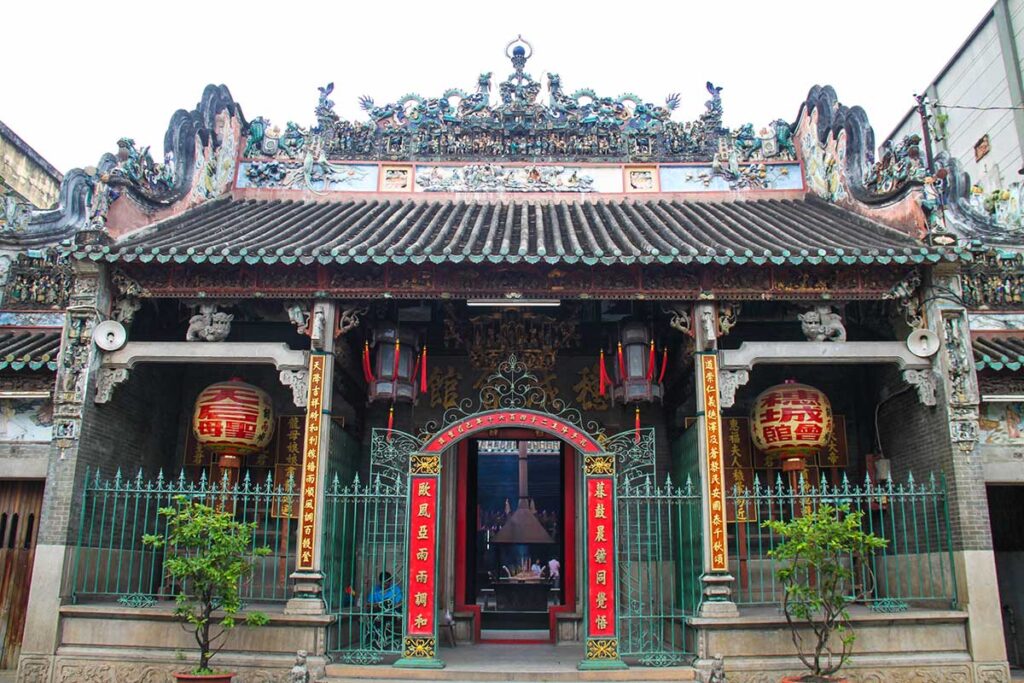
Thien Hau Pagoda, also known as the Lady Thien Hau Pagoda, is a significant Chinese temple located in Chinatown. Dedicated to the goddess of the sea, this centuries-old pagoda is known for its elaborate architectural details and ornate decorations. Inside, you can find beautiful statues, intricate wood carvings, and burning incense, creating a tranquil and spiritual atmosphere. It’s a place of worship and cultural heritage, offering a glimpse into the rich Chinese traditions and beliefs in the city.
12. Tan Dinh Church
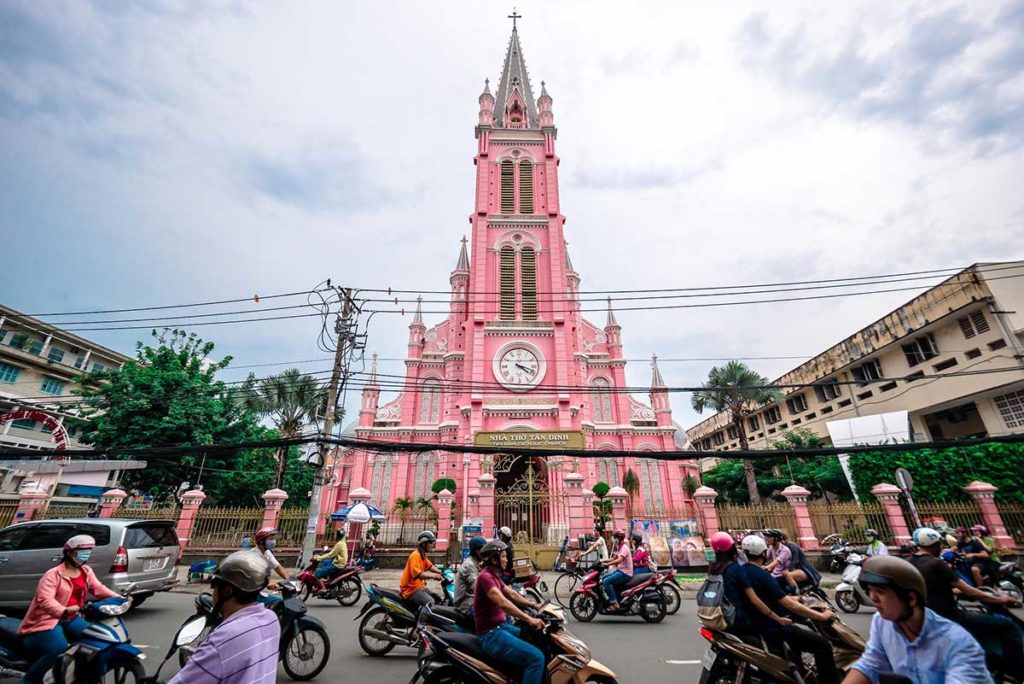
Tan Dinh Church, also known as the Pink Church, is a captivating Catholic church known for its unique pink exterior. Located in District 3, this beautiful church features exquisite Gothic and Romanesque architectural elements. Inside, you can admire the stunning stained glass windows and intricate religious artworks that adorn the interior.
13. Cafe Apartment Building
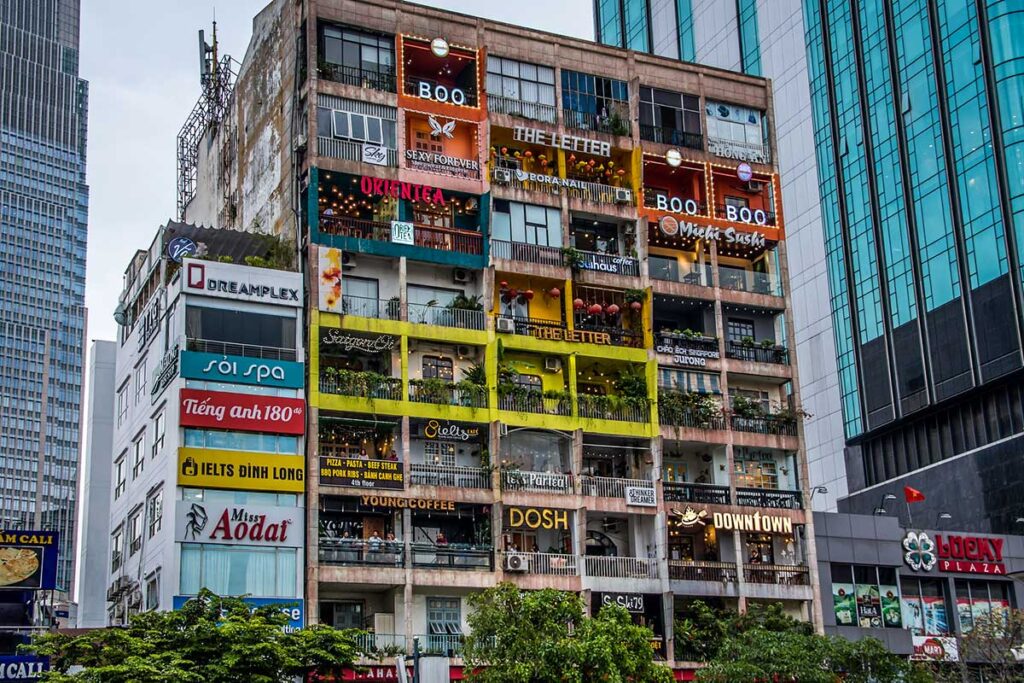
The Cafe Apartment Building is a hidden gem for coffee lovers in Ho Chi Minh City. This unique building is home to a myriad of cozy and trendy coffee shops spread across multiple floors. It offers a vibrant and eclectic atmosphere, perfect for enjoying a cup of coffee while soaking in the city’s bustling energy.
14. Hotel Majestic Saigon
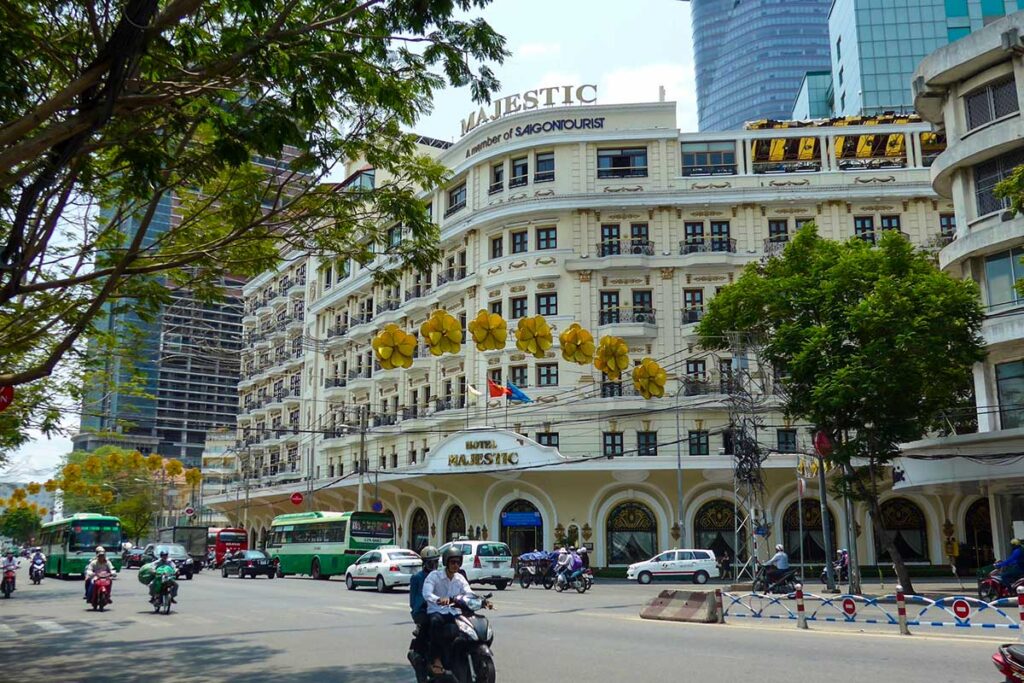
With its stunning French colonial architecture, The Hotel Majestic Saigon is a historic landmark in Ho Chi Minh City, known for its timeless elegance and grandeur. With a history dating back to 1925, the hotel has welcomed numerous prominent figures throughout the years.
15. Caravelle Hotel
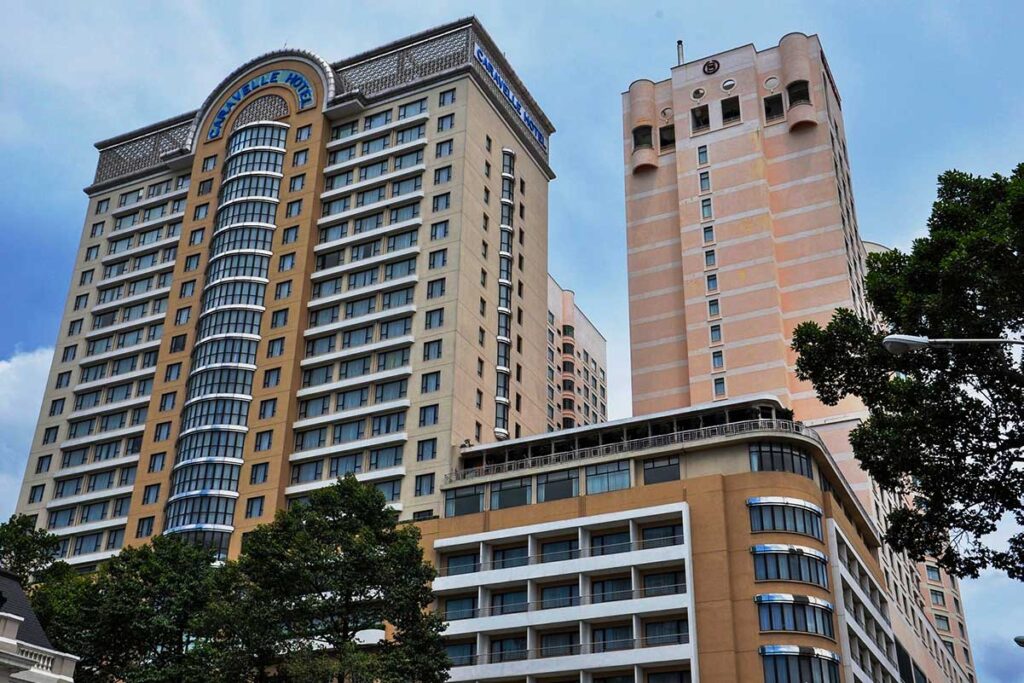
The Caravelle Hotel, one of the four historical hotels in the city, was established in 1959. During the 1960s, it became a prominent destination for foreign journalists, hosting the Australian Embassy, New Zealand Embassy, and renowned media outlets such as NBC, ABC, and CBS.
On the morning of August 25, 1964, a bomb exploded in room 514, which was occupied by foreign journalists, while they were all out on assignment. Following the fall of Saigon in 1975, the hotel was taken over and operated by the government under the name Doc Lap (Independence) Hotel. It was not until 1998, after refurbishment, that the Caravelle name was relaunched, carrying the hotel’s rich history into the present.
